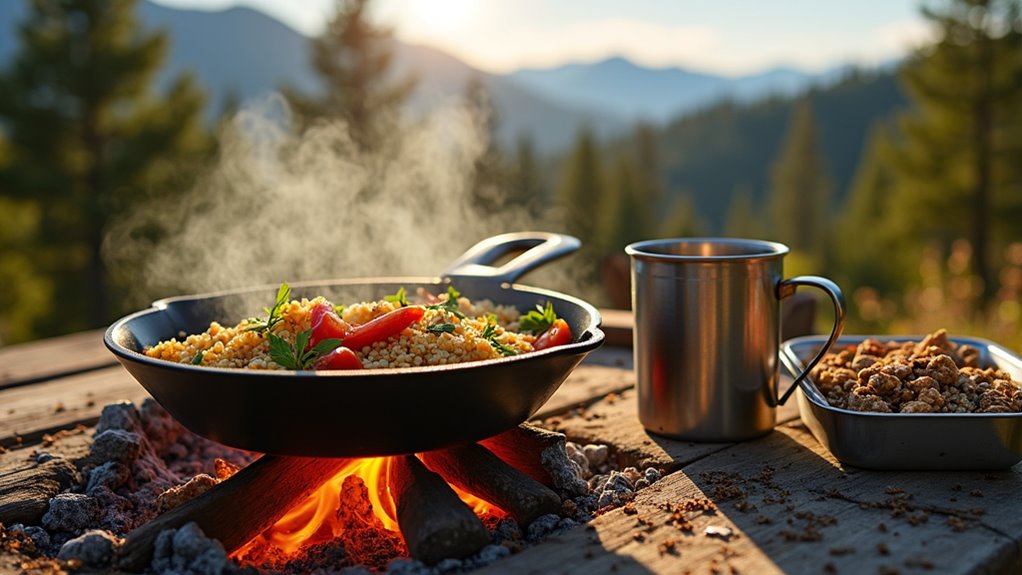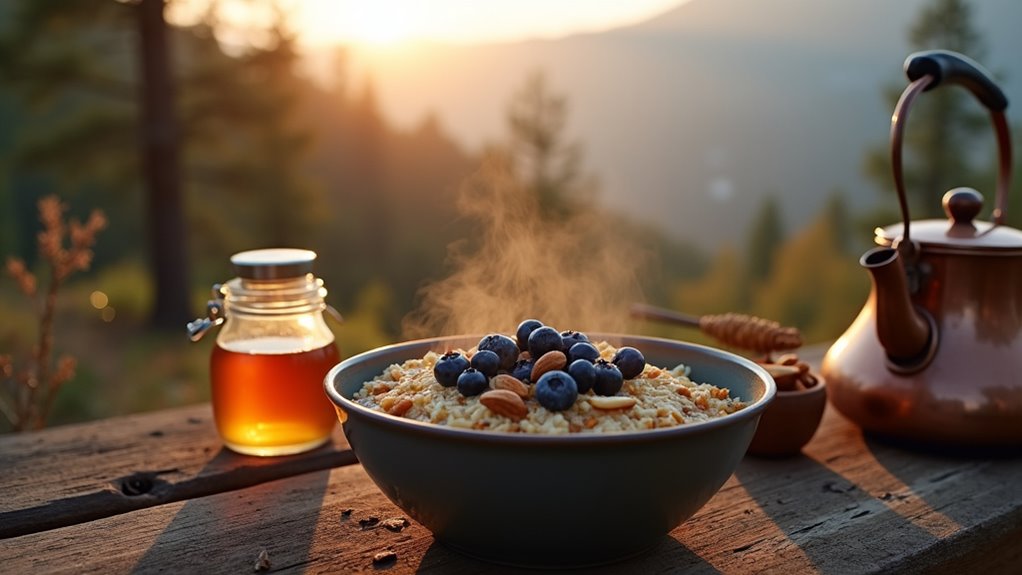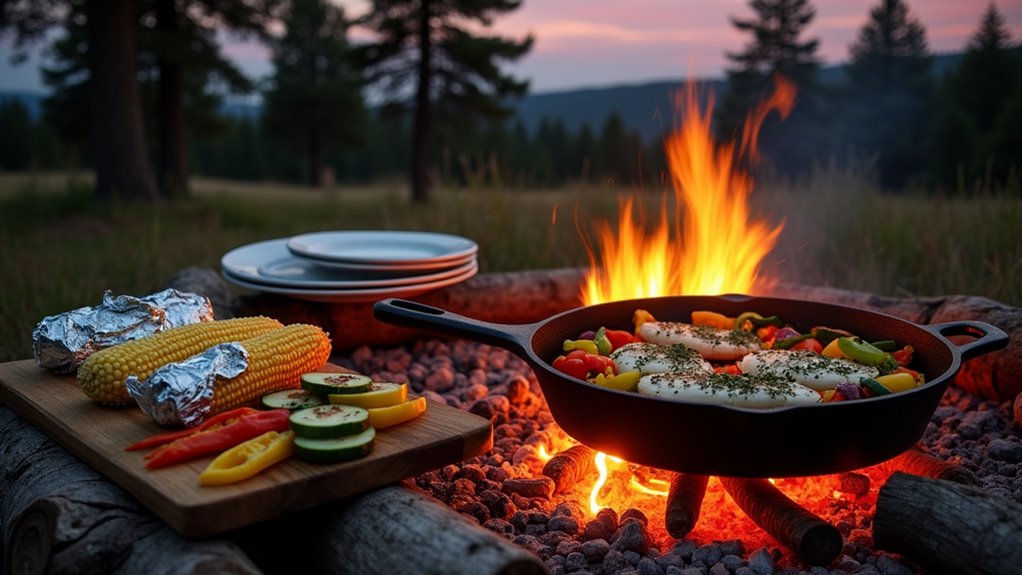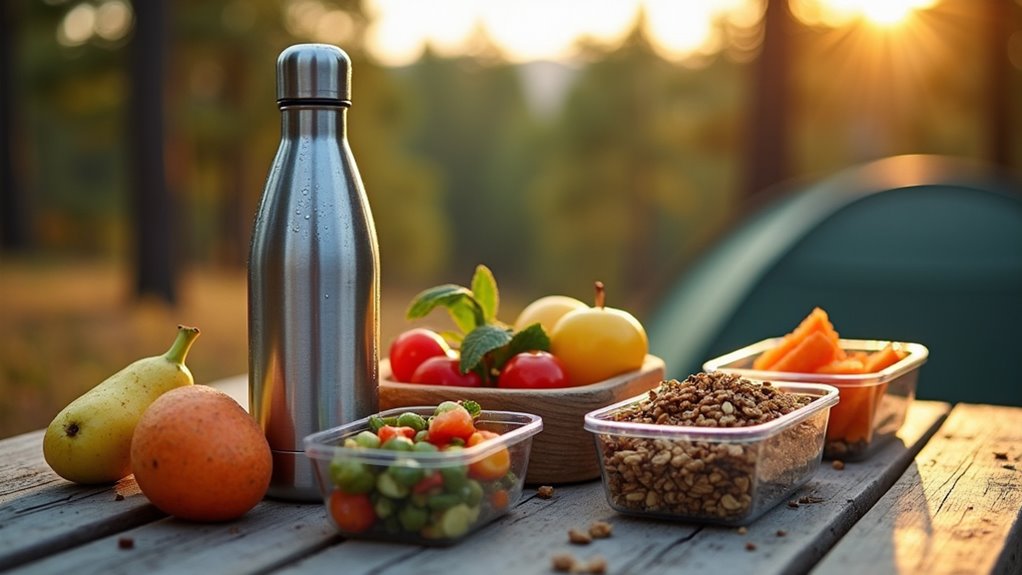Physical Address
304 North Cardinal St.
Dorchester Center, MA 02124
Physical Address
304 North Cardinal St.
Dorchester Center, MA 02124

Just when you thought camping meant surviving on trail mix, discover how to elevate your outdoor meals into nourishing wilderness feasts.
You’ll find that eating well while camping isn’t just about filling your stomach—it’s about fueling your outdoor experience. When you’re hiking trails or setting up camp, your body needs the right nutrition to keep up with the demands of wilderness adventure. While it’s tempting to pack simple junk food, smart meal planning can transform your camping experience from merely surviving to truly thriving. Let’s explore how you can maintain healthy eating habits while embracing the natural world around you.

When planning meals for your camping trip, taking a strategic approach guarantees you’ll need the right food for your outdoor adventure. Start by considering your trip’s duration and location – shorter trips allow for fresh foods, while longer excursions require non-perishables. You should check weather forecasts and nearby amenities to determine food storage options.
Keep your meal plans simple and efficient. Choose quick-to-prepare recipes that won’t cut into your outdoor activities, and pack nutrient-dense foods that provide sustained energy. Consider using one-pot meals to minimize cleanup efforts and save water. Focus on lightweight, compact options like dehydrated meals, trail mix, and energy bars.
Don’t forget to include easy meals for your arrival day and at least one slow-cooking dish for a relaxing fireside evening. Pre-measure ingredients and use airtight containers to minimize waste and keep food fresh.
Smart meal preparation at home sets the foundation for an enjoyable camping experience. You’ll want to dehydrate or freeze-dry individual ingredients and complete meals to slash weight while extending shelf life. Combine these ingredients in resealable bags for quick, water-only preparation on the trail. Consider packing 1½ to 2½ pounds of food per person daily to ensure adequate nutrition throughout your trip.
Preparing lightweight, shelf-stable meals at home ensures successful camp cooking with minimal fuss and maximum enjoyment on the trail.
Boost your meals’ nutritional value by incorporating protein-rich alternatives like chickpea pasta and instant quinoa. Don’t forget to add healthy fats through nuts, nut butters, or lightweight oils. Delicious camping recipes can help inspire your meal planning for your next outdoor adventure.
When preparing your ingredients, make sure they’re completely dry before packaging, and vacuum seal when possible to prevent spoilage.
For convenient protein sources, pack chicken or tuna packets, or opt for plant-based protein powders. Use instant staples like minute rice or dehydrated beans to minimize cooking time while maximizing nutrition during your outdoor adventure.

Starting your day with a nutritious camping breakfast fuels your outdoor adventures and maintains energy levels throughout the morning.
You’ll find both no-cook and cooked options that deliver essential nutrients while keeping preparation simple. Pack ingredients abundant in complex carbs, healthy fats, and protein to sustain your activities.
Planning quick and satisfying lunches is essential for an enjoyable camping experience. You should concentrate on options that require minimal prep time and cleanup while delivering the energy you need for outdoor activities.
Consider preparing no-cook meals before your trip, like pasta salads, chicken salad wraps, or protein-packed chickpea sandwiches. For hot options, one-pot meals like chili or jambalaya can be cooked in the morning and enjoyed later.
Don’t forget the classic BLT – just cook the bacon over your campfire and layer it with fresh vegetables. The summer Panzanella salad offers a refreshing way to use leftover bread while camping.
Make smart use of your campfire with quick skillet meals. Try grilled quesadillas, flatbreads, or foil packet meals that combine vegetables and pre-cooked meats. Delicious camping recipes can also be a great source of inspiration for your outdoor cooking.
Remember to pack plenty of protein-rich ingredients and fresh vegetables to keep your energy levels high throughout your adventure.

After fueling up with lunch, dinner becomes the highlight of any camping day, offering a chance to gather around the campfire and create memorable meals.
Gathering around a flickering campfire to prepare dinner creates lasting memories and brings outdoor adventures to a perfect close.
You’ll find several cooking methods that make campfire cooking both easy and delicious, from foil packets that lock in moisture to Dutch ovens perfect for hearty stews. Choose healthy proteins like salmon or chicken kebabs, and pair them with nutrient-rich vegetables that cook beautifully over the flames. Try grilling salmon skin-side up for maximum flavor retention and juiciness.
A camping fridge can help keep your dinner ingredients fresh and chilled, making it a worthwhile investment for the avid camper. Pre-marinate your meats and pre-cut vegetables at home to save time and minimize campsite prep. Combine proteins, vegetables, and complex carbs in foil packets for balanced, no-fuss meals. Keep a cast iron skillet handy for versatile cooking options, from morning eggs to evening stir-fries.
Remember to store your ingredients properly and pack lightweight, reusable dishware for an eco-friendly dining experience.
Whether you’re hiking through dense forests or scaling mountain peaks, maintaining energy levels through healthy snacking is essential for any outdoor adventure. Pack nutrient-dense options like trail mix, which combines nuts, seeds, and dried fruits for a perfect balance of healthy fats, protein, and fiber.
You’ll want to focus on portable, non-perishable items that pack well and provide sustained energy. Consider beef jerky for protein, granola bars for quick carbs, and pre-cut veggie sticks with single-serve hummus for plant-based nutrition. The fresh air and space of camping naturally enhances the enjoyment of these healthy snacks. Simple and Delicious Camping Meal Ideas to Try can provide further inspiration for your camping menu.
For customization, you can prep your own snack packs at home – try making Greek salad skewers or peanut butter banana rollups.
Don’t forget to accommodate dietary preferences. Roasted chickpeas and buffalo cauliflower bites offer satisfying alternatives for vegetarians, while dried fruits and nuts work for most dietary needs.

Maintaining proper hydration and food storage can make or break your camping experience. You’ll need at least 2 liters of water daily, but don’t wait until you’re thirsty to drink – that’s already too late. While hiking, take frequent small sips rather than large gulps, and drink plenty at water sources to reduce the weight you’ll carry. Consider implementing the Siesta Theory by hiking during cooler parts of the day to minimize fluid loss and conserve water.
Smart tips for safe food storage while camping can help ensure your meals stay fresh and safe.
Store perishables with ice packs and separate raw from cooked foods to prevent contamination.
You’ve now got the tools to make your camping meals both nutritious and enjoyable. Studies show that 73% of campers who plan their meals in advance report a more satisfying outdoor experience. By following these meal strategies, you’ll spend less time worrying about food and more time connecting with nature. Remember, it’s not just about eating – it’s about fueling your adventure while staying in harmony with the wilderness.